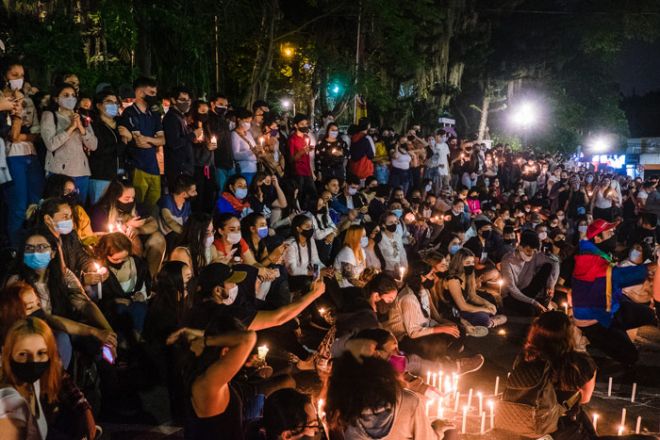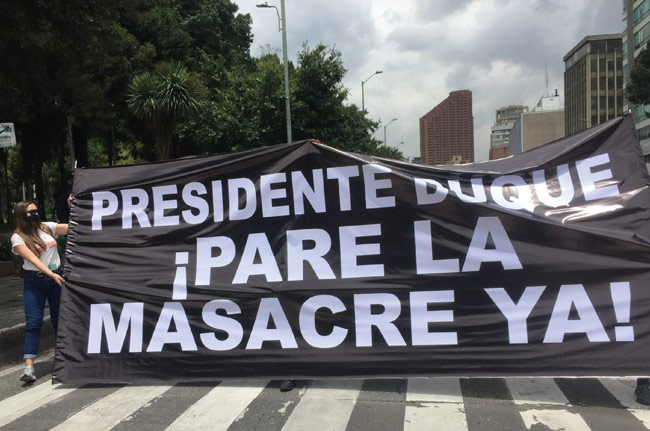Let’s Raise Our Voices for Human Rights in Colombia
Published on June, 02 2021
Demonstrations against the economic policies of Colombian President Ivan Duque by citizens in Medellin, Colombia, May 5, 2021. Photo: Wirestock Creators / Shutterstock.com.
By Leni Villagomez Reeves
Co-chair, Cuba and the Bolivarian Alliance Committee
June 2021
We are being urged by people of Colombia, including the president of WILPF Colombia (LIMPAL) Diana Maria Salcedo, who spoke recently from Colombia:
- To raise our voices against the Duque government violence;
- To promote international human rights intervention in the situation. The Inter-American Commission on Human Rights is ready to come to Colombia and examine the human rights situation during the General Strake – Paro Nacional. United States and international pressure can make the Duque government allow this;
- To work to end US military aid, sponsorship, and presence in Colombia.
What Can We Do?
There is a Dear Colleague letter directed to Secretary of State Antony Blinken circulated by Rep. James P. McGovern (MA) and co-led by Rep. Mark Pocan (WI), Rep. Jan Schakowsky (IL), and Rep. Raúl Grijalva (AZ). This letter denounces the excessive violence against citizens by Colombian Security Forces, National Police and riot police (ESMAD), and calls for the suspension of all US direct assistance to Colombia’s National Police, especially to Mobile Anti-Disturbances Squadron (ESMAD) riot police unit.
Ask your congressional representative to sign on to this letter, please.
Why Speak Out?

This Duque Pare Banner picture is from the WILPF Colombia (LIMPAL) website, used with permission.
Colombia has risen in protest against a right-wing government that has mishandled everything: health, education, the economy, pensions, police and military violence, and of course the pandemic. Community, labor, feminist, environmental, and campesino/Indigenous organizing for change has been met by paramilitary death squads and regular assassinations of leaders. (See my article “In Colombia, the Struggle Continues” on pp. 7-9 in the Winter/Spring 2021 issue of Peace & Freedom.)
The spark that ignited this for the urban poor and organized labor was a proposed regressive sales tax on food, fuel, and basic services like water and electricity – and even on funerals – in the middle of the pandemic. These are neoliberal fiscal policies designed to take from the poor to benefit the rich. The renewed spraying of glyphosate has also mobilized campesinos and Indigenous peoples in rural areas. And right-wing President Ivan Duque’s orders to the Escuadrón Móvil Antidisturbios (ESMAD), with their reckless and often lethal response to stop the protests at all costs, made people angrier. ESMAD is a US-trained and funded attack unit connected to the Colombian Army and designed to repress movements for social justice throughout the country.
Paro Nacional — General Strike
There is an ongoing national strike, with broad participation: unions representing most of the workers of Colombia, including the teachers, regional and national Indigenous organizations, students, and community, including feminist organizations. This is only the latest and largest of a series of protests and actions. The strike and demonstrations have been suppressed – or rather attacked – with great brutality by the government.
The human rights organization Temblores has verified at least 1,773 cases of militarized police violence resulting in at least 40 deaths, thousands of wounded, over 900 arbitrary detentions, 33 attacks on journalists, and 12 cases of sexual assault by police. On May 13 one of the victims, a minor, killed herself after being raped in Papayán by the Escuadrón Móvil Antidisturbios.



